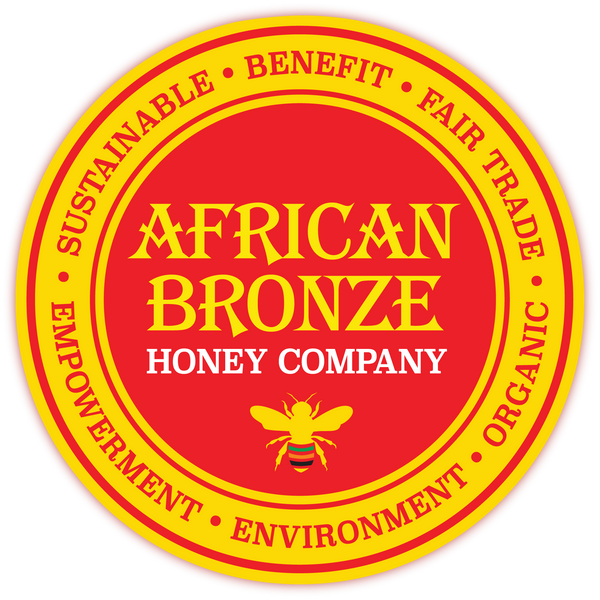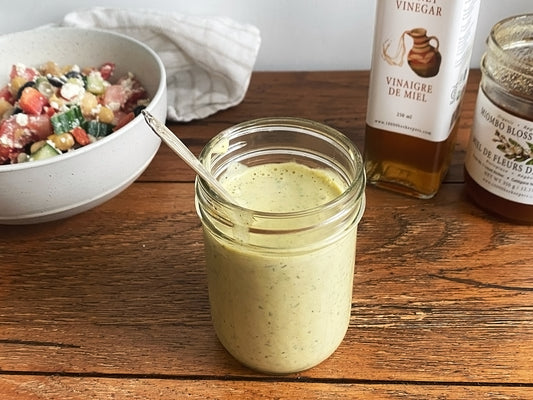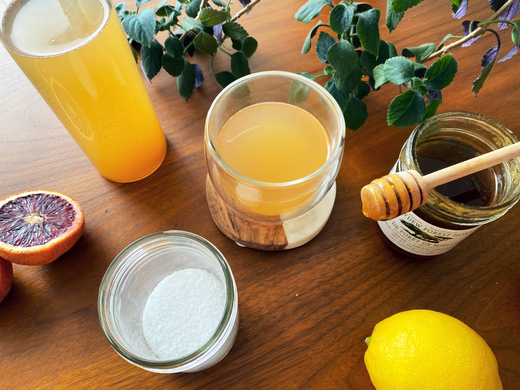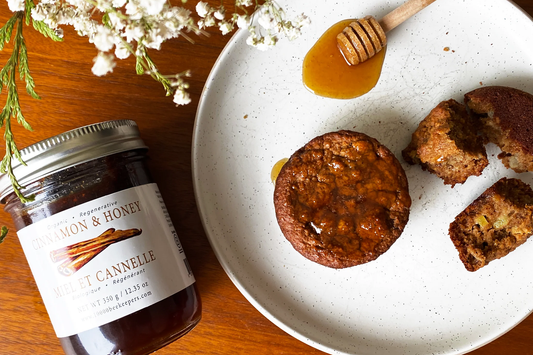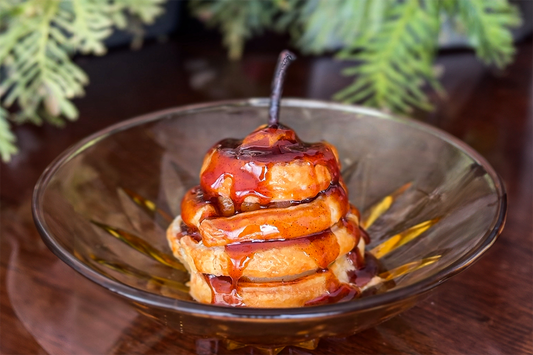African Bronze Honey Company is now certified Woman Owned Business!
Share
Looking for Eco Friendly Companies to Support? Read on this Q & A with Liz Connell, Co-founder and President of African Bronze Honey Company
Can you give a brief history of the business and your motivation behind your drive of starting it?
We lived in Zimbabwe, in Southern Africa, for about 8 years in the 1990s. I ran a computer training school and my partner, Paul Whitney, had a chemical recycling business. We went there as entrepreneurs, to do business, and one thing we saw there was that aid projects didn’t really work, because when the money ran out, things would fall apart. By 2000, life had become very complicated with the political situation in Zimbabwe, so we came back to Canada. (Incidentally, the two businesses kept on for years.)
Years later, a friend of ours from Zimbabwe got in touch with us in Ottawa. He’d gone up to the bush in northwest Zambia just before we’d left Africa, and we hadn’t heard from him since. We knew he’d started a beekeeping business with local people, but we had no idea how things had gone. He’d started by training a couple dozen beekeepers in sustainable ways to harvest honey in order to protect the forest from deforestation. His goal was to provide income to locals through business, while saving the forest he was born in. By the time we met up with him again in 2012 (almost 14 years later) he told us that he’d trained 6,000 beekeepers, and that they were harvesting about 800 tonnes of certified organic honey a year! Our jaws dropped and we talked about it all afternoon.
He was looking for someone to help market this honey in North America, so they could produce more honey, train more beekeepers, and protect more hectares of forest. We were intrigued! That was in January, 2012. We talked about it constantly for the next few months.
By April we’d created the African Bronze Honey Company! It took us another year to work out our business plan and put together the funding. By July 2013 we’d ordered 28,000 bottles, that’s one full 20 foot sea container loaded to the brim with organic African forest honey. Needless to say we started selling!
We’ve learned a lot along the way. For example, we learned that nobody makes money selling honey in little bottles, except “big honey.” We also learned that a lot of the honey on big grocery store shelves has been adulterated, but the testing regimes in place can’t detect this. All of this has helped us become more determined to be successful in selling this honey, because this is real honey made by wild bees. It’s the way honey used to be before modern agriculture and pesticides.
Now we market direct-to-consumers, direct to independent retailers (like fair trade and organic food stores). We also market to food, beverage and cosmetics manufacturers who are looking for ethical, sustainable, organic ingredients for their products.
We now also work with a beekeeping project in Tanzania that was inspired by our friend’s project in Zambia. They produce organic honey in wilderness areas and National Parks in the miombo forest. These projects help marginalized people living in remote areas to become beekeepers and earn a sustainable income for themselves and their families, while also protecting vast forest areas. Our job is to tell the story of how doing business can be good for people and the planet… and to ensure that their product has a market. One really cool thing is that they’ve recently calculated their carbon footprint, and it turns out that forest honey is massively carbon negative! In fact, the project in Tanzania captured 28,000 tonnes of carbon from the atmosphere last year! That works out to 20 kgs captured for every bottle of honey harvested!
This is the kind of thing that really excites me, and these are the reasons we became a certified B Corp way back in 2016. Our motivation behind starting African Bronze Honey has always been to do business that is better for the planet and all the people involved.
Who are some women leaders that you draw inspiration from personally?
I believe that the woman that we all draw inspiration from from the start in every culture is our mother. Mothers show us how to act with kindness and to nurture and protect those around us. They help to shape us into the individuals that we become, and teach us what’s right and what’s wrong. I think the world of business would be better for people and the planet if business leaders behaved as if their mother was watching.
Two women leaders in the business world that I find very inspiring are Vicky Saunders and Victoria Lennox. Vicki Saunders is the founder of SHEEO and I find her foresight, support and encouragement of women entrepreneurs inspiring. She’s built a dynamic infrastructure to support them. I also love how her organization focuses on the sustainable development goals. It’s what the world needs right now. Another amazing women business leader is Victoria Lennox, Victoria is President-emeritus and Co-founder of StartUp CANADA. Victoria had the idea that Canada needed to foster its entrepreneurial culture and she turned it into a national movement of entrepreneurs supporting each other. Her work has kickstarted hundreds, if not thousands, of successful Canadian businesses.
Why a B Corp? There are certainly easier and more profitable ways to start a business. Why was becoming a certified B Corp so important to you?
We became certified as a B Corp in 2016. We knew early on that becoming a B Corp was an important statement and an important step for us as a company. We were looking for ways to reach customers who would care about what we were doing as a business. People who are interested in purchasing from B Corps generally have similar core values as we do in our business. They care about the environment, the producers, equality and inclusion when looking to buy a product. We were looking to reach customers who also believed in the idea that business doesn’t always have to put profit before people to still be successful.
When we looked into what it took to become a certified B Corp, we realized that we already met all of the requirements, and that the B Corp values were already built into our DNA. It was a no brainer! It has been one of the best business decisions we have made, and has opened up a community of like minded people who have supported us and shared our philosophy of better business along our journey.
What are some of the challenges that you have faced in business so far, and what lessons have you learned through them?
There have been many challenges over the years when starting up our business. Money played a big part, especially at the beginning of starting ABHCo. We had to make sure that there was enough money not only to keep the business afloat, but just to buy honey! From when we order a container to the time it arrives, can be 4 to 6 months! That’s a long time for money to be tied up before you can actually sell and get receivables.
Also, understanding when starting a business making decisions and deciding the direction to take can be a challenge. You start with a business plan, but things don’t always work out the way that you had anticipated. I’ve learned over the years that although it is good to have that plan, you must be able to adapt, adjust and problem solve as you go.
Another main challenge has been reaching people and getting the message across in a way that persuades people to try new things. When we started African Bronze, we planned to sell our honey through school fundraisers. We thought it would be a great fit. But, that’s actually a very difficult market to break into, things didn’t go as smoothly or profitably as planned, so we had to take a step back and re-evaluate. We then made the business decision to aim more for business to business sales in order to sell a greater volume of honey. This has been a good direction for us and has allowed partnerships with some amazing fellow B Corp businesses.
We’ve learned that persistence, constantly being able to learn and pivot (long before COVID), and to never give up, are the keys to finding success. If something seems impossible, you need to use problem solving to find a solution, or know when it’s time to redirect to a better path in order to move the business forward.
What advice would you give to other women looking to start their own business?
Write a business plan! Talk to people about your plans. Things may not always turn out the way you planned, but it is an incredibly valuable tool to have when starting a business. That being said, be flexible, and don’t be stuck to it! Touching on what I spoke about previously, you need to know when to re-evaluate when things go a different way. Don’t be afraid to make changes or re-evaluate old decisions if making changes will benefit your business and help you achieve your goals. It’s also important to have goals that are not just about making money. In order for business to be successful you need to be solving a problem, not just chasing money.
I always try to remember the concept of interdependence: What you do affects other people, so you might as well do the right thing, and it will affect everybody in a good way.


